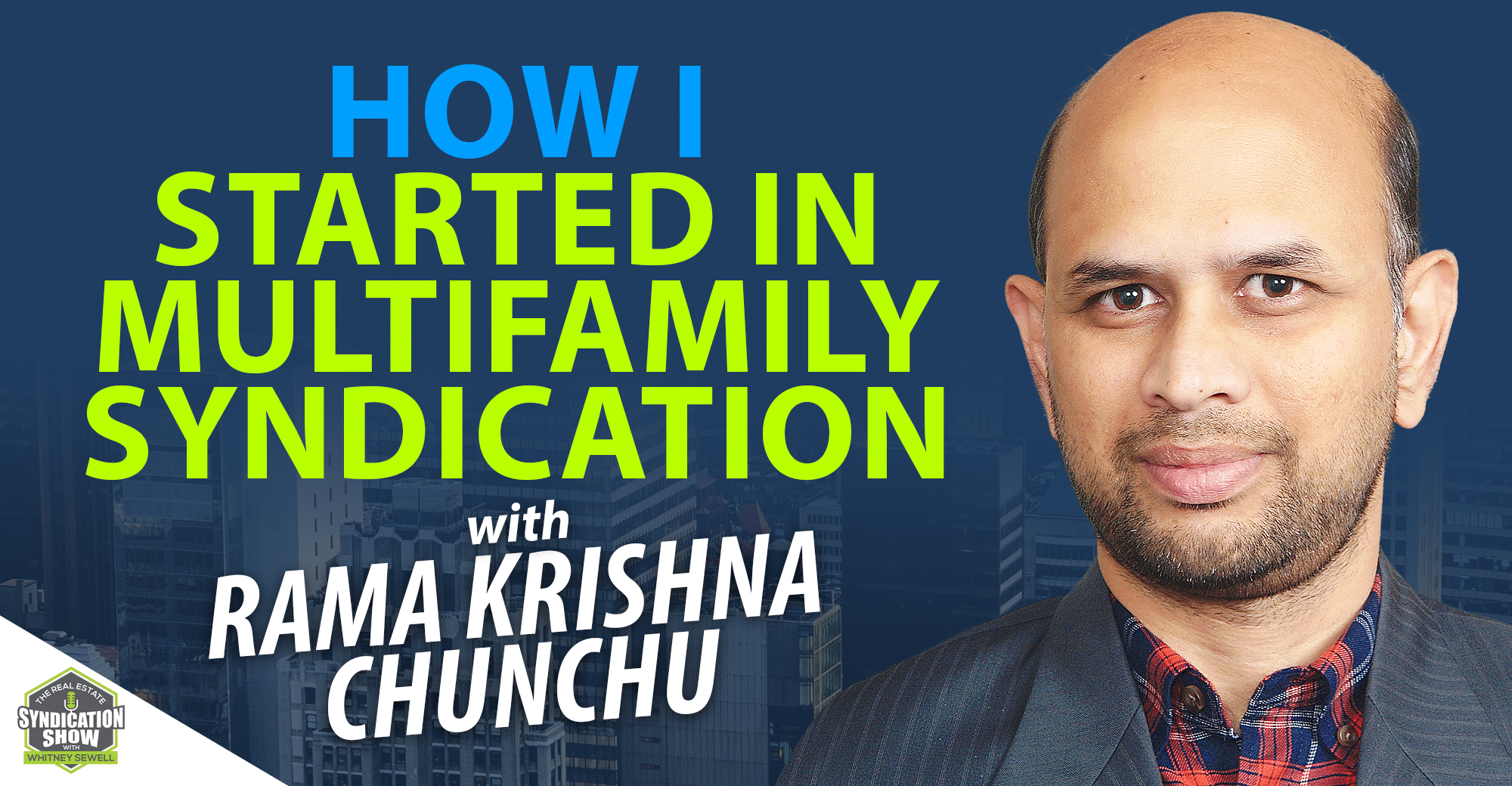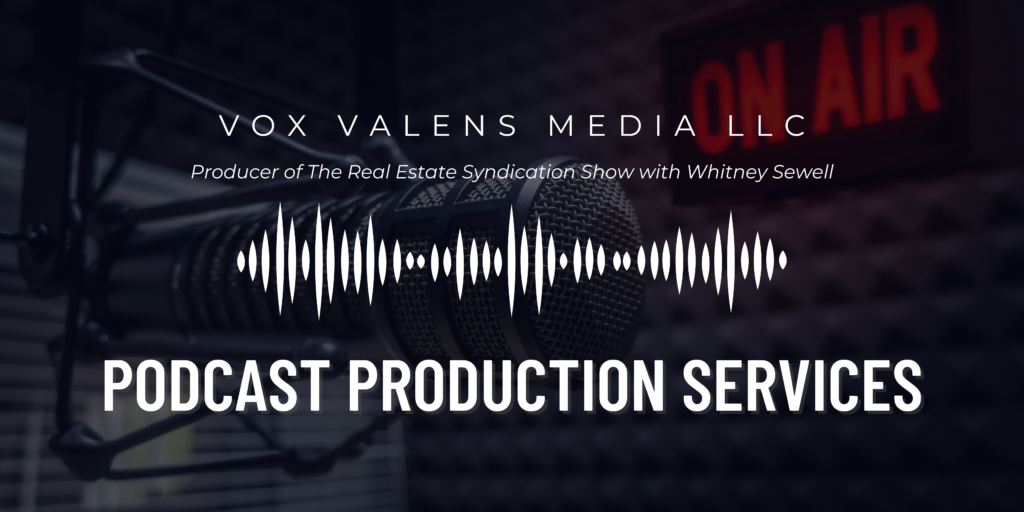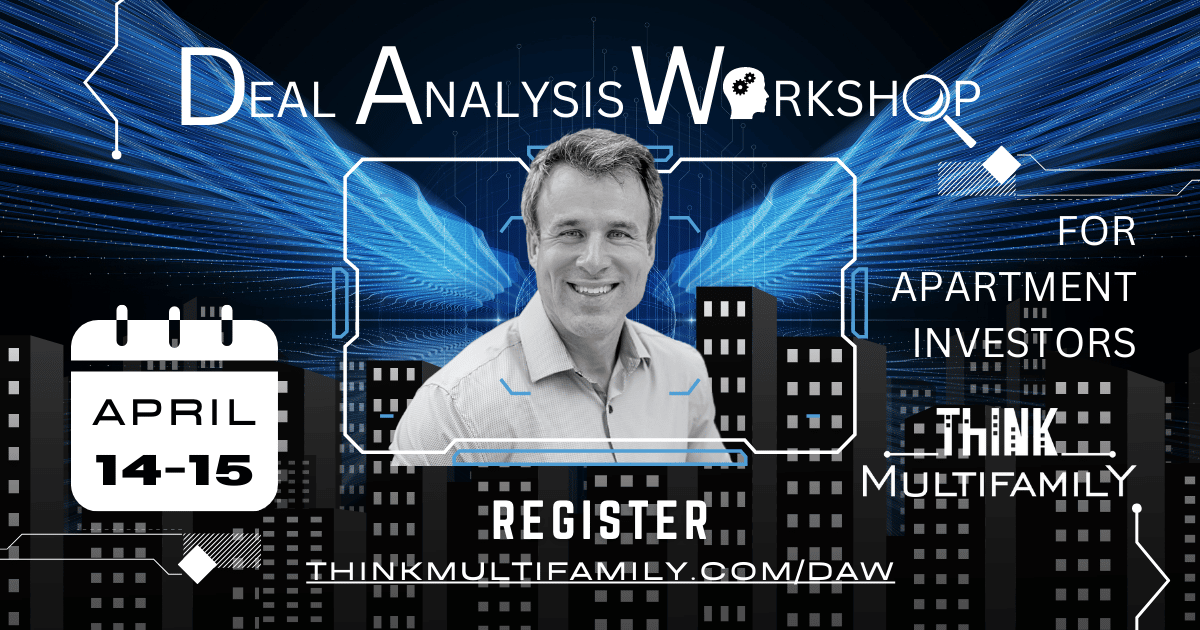
Many career professionals, especially those earning healthy incomes, look for ways to put their money to work, earn passive income and potentially build wealth. Thus, many, especially those holding a lucrative day job, turn to passive real estate investing to accomplish these goals. While most remain passive investors, there are highly-motivated and driven individuals who go on to active investing as general partners or co-GPs in multifamily syndication.
Our Gracious Sponsors
Vox Valens Media

The team that produces The Real Estate Syndication Show is now available to produce podcasts for you! View our list of services and rates here or book a call to know more!
📱https://calendly.com/voxvalensmedia/podcastproduction
DEAL ANALYSIS WORKSHOP

Deal Analysis. The #1 Critical Skill EVERY Multifamily Investor MUST know!
Want to take your investing career to the next level? Then check out Think Multifamily’s Deal Analysis Workshop.
For more information, go to www.ThinkMultifamily.com/daw.
Watch the episode here:
Listen to the podcast here:
Such is our guest in today’s episode. Building a 15-year career in the IT industry, Rama Krishna Chunchu of Usha Investment Group has now chosen the path to active investing in the multifamily syndication space. Before doing so, he pursued various means of learning real estate investing – from reading books, listening to podcasts, attending conferences, joining mastermind groups, and investing in deals as a passive investor. Listen now and gather how an IT professional gets a start in real estate investing and becomes a co-GP in multifamily syndication.
Key Points From This Episode:
- Rama’s career background.
- How Rama got into real estate investing.
- How Rama educated himself about the various aspects of multifamily syndication.
- Rama’s experience as a passive investor in syndication.
- How Rama became a general partner (co-GP) and ran his first syndication.
- How did Rama analyze the first property for syndication and what made it a compelling investment?
- Facts and figures about the syndication deal and the acquired property: acquisition cost, financing and funding source, average rent per unit, occupancy rate, and % change.
- What improvements or additions were made to the purchased property?
- What were the challenges encountered in operating the property?
- Lessons that Rama learned from the first syndication.
- Rama’s current role and responsibilities in the syndication.
- Rama’s contact details and information on Multifamily AP360 Virtual Summit.
Tweet This!
“Managing multiple assets and also working full-time is a bit challenging so I thought of scaling through other aspects and that’s how I found multifamily.”
“I started exploring multifamily by learning, by reading books and listening to podcasts like this, and also attending conferences.”
“I started investing passively in a couple of deals then moved toward the active side.”
Links Mentioned:
Multifamily AP360 Virtual Summit 2023
About Rama Krishna Chunchu

Rama is the Founder of USHA Investment Group LLC. Rama Krishna is both an active and passive investor in multi-family apartment syndications. Equity partner in 750+ units’ multifamily assets, in FL, MD, and NC markets. GP in 64 units. With more than 15 years of experience as an IT professional, Rama Krishna brings his expertise to analyzing markets, underwriting deals, raising capital, and asset management.
Full Transcript
EPISODE 1559
[INTRODUCTION]
Rama Krishna Chunchu (RKC): I started exploring multifamily by learning, reading books or listening to podcasts like this, and also attending conferences. And, until I started investing passively in a couple of deals then towards the active side. So far, I closed one deal as the general partner, six to four years in Charlotte MSA, and keep looking for more deals in the multifamily space.
[INTERVIEW]
Josh McCallen (JM): Welcome back to the Whitney Sewell podcast called The Real Estate Syndication Show. It’s great to have you here. My name is not Whitney Sewell. I get to be a guest host today and I’m a big fan of Whitney. So, it’s an honor to be his guest host. My name is Josh McCallen, met me before on the Capital Hacking Podcast and it is an honor to guest-hosts on my buddy’s show. So, today you’re in for a real treat. Not only do we get to spend a few moments together, just kidding. But Rama Krishna is here. We brought him in through the ether. He’s through Zoom with me. You’ll see him on YouTube. If you’re listening now, go check him out on YouTube. His episode’s up and he owns Usha Investment Group. He’s passionate, like you and I, about investing through syndication, and owning commercial real estate like multifamily and we can’t wait to get him on the air. So, welcome to the air, Rama.
RKC: Thank you so much, Josh. It’s a great honor to be part of a syndication show. I am a huge fan of this podcast.
JM: Me too. It’s a great, great podcast and they always bring on people like you which are wonderful stories. So, for that, would you mind sharing a little bit about your background, and where you live? And what brings you here today?
RKC: Awesome. Thank you very much. So basically I came from India. I came two years in 2007 as IT professional. So, I worked for around 15-plus years in the IT space and in 2014-15, I started investing into real estate. Mainly started with single families, townhomes, then managing multiple assets. And also working full-time is a bit challenging so I thought upscaling through other aspects, that’s how I found multifamily.
So, I started exploring multifamily by learning, by reading books or listening to podcasts like this and also attending conferences. And, until I started investing passively in a couple of deals then towards active side. So far, I closed one deal as the general partner, six to four years in Charlotte MSA and keep looking for more deals in the multifamily space.
JM: You know, it’s exciting to meet you and I always love meeting people that come to this country and grab life big like you’re doing and just get involved in your dreams and building something. You know, as an IT professional, I imagine you analyze deals very well you get into the details. Is that one of your superpowers?
RKC: Yes, yeah, definitely, that is my strength at this point.
JM: Okay, so why did you choose what we’re both now here on the show talking about syndication as an investment strategy, why not just buy houses and flip them and wholesale? What brought you all the way into the space of syndication?
RKC: So, definitely, I started with buying and flipping stuff. So, but, you know, these are challenging, you know, I was working full time and you know, managing these properties in multiple locations. And also, you know, many like loans plan that also there is some kind of restriction so you can purchase, you know, up to 10 units. Behind that is a challenge to getting dev side. And also if your properties or multiple properties scattered across multiple locations are challenging from the managing point of view. And also multiple locations in same city, if scattered across multiple cities is also challenging to find multiple, you know, property management companies or if I manage, self-manage, then it’s challenging for me to manage, you know, multiple locations that are suited towards multifamily, you know.
Multifamily side is you will get non-commercial loans, non-recourse loans mainly. And also you can hire, you know, full-time property management company or full-time maintenance guy, full-time leasing agent to manage these properties in a single location and stuff now spreading into multiple locations. And also, you know, these are the advantages of going within multifamily. Scalability, you will find multifamily is better. And also it can leverage, you know, leverage the upside and also leverage others other skills, you know, other team members’ skills in multifamily.
JM: I love that answer. So to summarize, we do hear that a lot. You know, I asked you about why not just do single and you said, well, isn’t it great? You know, we can get to about 10? I think he said as a single if you were buying single houses, you believed you would have gotten to 10. But when you went into syndications, you were able to get to hundreds today summarize that right and then you love the idea of being able to hire a property management group if they’re big enough, and the units if there are enough units and then maybe even higher maintenance person then hire a leasing agent. So I hear a lot of business thinking there and that’s what brought you to syndication now. There’s some other catalyst because not everybody goes from a house to a multifamily. Was there an education program or how did you learn about what you now know in multifamily syndication?
RKC: So, mainly I started with reading books, a lot in BiggerPockets, a lot of content is there and also listening to, you know, podcasts like Michael Blank and Joe Fairless. And you know, Whitney Sewell’s podcast, listening to a lot of podcasts and reading other books like David Lindahl’s books on you know, other books and also attending like a mastermind group, various mastermind groups, so that’s how I started into multifamilies.
JM: That’s very good. I’m glad to hear Whitney’s group was part of that whole chain of wonderful events. That’s been like millions have heard this podcast. So it’s a big honor to have you here from the community. So was there a friend as well? Or maybe a girlfriend or a wife? Who was it that got you started thinking about real estate? Because you know, the typical person who does well like yourself in IT probably puts capital into the Wall Street market. I would think the normal person. So, who introduced the whole idea to you? Was it a friend or a relative?
RKC: I can say it’s a friend, one of my college friends, he was exploring, you know, out-of-state properties. He was exploring coming to market. That’s how I started.
JM: That’s great. And okay, today, let’s fast forward, you have joined as a passive investor in many syndications. How many would you say you’ve invested in? And what has your experience been so far with the passive side of syndication?
RKC: So I’ve invested in a couple of deals. Mainly, I have good experience. I have no bad experience, I can say, at this point, I’m getting good communication, monthly distributions or quarterly distributions. And also you know, everything’s going well, I can say.
JM: And then today, how long has it been since you became a general partner and ran your first syndication?
RKC: So yeah, we closed my first deal last year. It’s almost close to one year I can say, 64 units in Salisbury, in Charlotte MSA.
JM: Okay. And when you went through this, you know, this will be a great deep dive into the education that you can provide today, would you share with us how you analyze that 64- unit and what made that property so compelling for you as an investment syndicator?
RKC: Yes. So, we got this deal through broker relations, a broker presented this deal. So once we got, you know, information like operating memorandum, and T12 on rentals, so you plug in all these numbers into, you know, underwriting model and you know, analyze the deal by trying the different combinations like agency debt, bridge debt and rent projections and different stuff and so the price per unit is very good for this property. And also it’s a good location, good MSA like Charlotte MSA and North Carolina and IT FICO corridor is growing markets, emerging markets, and that is one of the main reasons, market and also like population growing and job growth it’s as good in these markers. And also the price, we got it for you know under 100k per door per unit, very challenging to get below 100 per unit a year and you know even current market is a very very competitive market getting this below 100k is challenging, a big challenge.
JM: Which is very true 100k is definitely a good threshold. What is the rent for that unit that property can afford, one unit at the one you purchased? What is an average rent?
RKC: So, when we purchased the average rent was around $750, $750 per door. Like two-bedroom is turning around $850 and one-bedroom, around $700. Right now, we are almost achieving around $1,000 for two-bedroom and around $900 per one bedroom.
JM: So, you brought it up, to repeat that $1000, almost $1,000 per two bedroom up from about $800. So, a 20-plus percent lift and then you’re running the single room, one-bedroom from $750 to what? What is it now?
RKC: $900.
JM: $900. And how is your occupancy doing?
RKC: So occupancy? We are good, right now we are around 95% occupancy. So, we stabilized the property in the last nine to 10 months.
JM: And what was it when you bought it? How much occupancy?
RKC: So, occupancy was good, around 90%, 80 to 90% but you know we have challenges with you know I mean rentals. We get a lot of bad tenants, 30 to 35 percentage so NP is a property right now.
JM: Well, let’s keep learning from you if you don’t mind professor. Teach us about some of the challenges when you got there that’s a lot of increase you know it’s a good increase for you and your investors in rent. Did you need to do construction? How much was that budget? Those types of facts and the challenges at the beginning.
RKC: So yeah, so when we purchased, occupancy was good, we had no bad tenants. So we have a lot of bad tenants and it took some time but from renovations point of view, we did some good improvements like you know, parking, we fixed the parking lot, we renovated the complete parking lot. From an interior’s point of view, so interior’s point of view, we did like minor renovations. Whenever there have been evicted tenants, we did some kind of moderate renovations and those kinds of stuff. And the one thing impacted is loan. I know interest rates we purchased with a bridge loan so the raise was a bit low when we purchased. Now it increased. So, that definitely impacted all our returns. So we need to pay higher mortgages.
JM: You have to pay higher what? Can I ask you to repeat what you just said?
RKC: Mortgage trends, mortgages.
JM: Mortgages. Okay. And are you out of the bridge loan now? Or are you still in the bridge loan?
RKC: So we are still in the bridge loan.
JM: Okay, and what is your strategy to get out of the bridge loan?
RKC: So, we purchased the rate cap, so but we were at this point, we have, like almost six points, seven points something, we are paying around that. We were exploring, you know, agency debts, but you know, we were exploring at this point, I can say.
JM: Exploring it. And this property was purchased when?
RKC: 2022, around March.
JM: Okay, so less than a year, almost a year. And what have you learned that’s going to allow you to do a really great job in the future?
RKC: So definitely now, so we need to keep more reserves, to see, you know, all these kinds of changes. Definitely keeping an appraisal set is important as underwriting more conservatively. It’s definitely, I will consider.
JM: Those are smart choices. What was the size of the overall purchase? Was it $6 million? $7 million dollars?
RKC: $5.12, $5 million.
JM: Okay. $5.1 for 60 units. So, under $100,000, got it. And when you bought it, how much debt did you need? And how much equity did you need?
RKC: 70 LTV. So, I think we got around 3.7 debt from lender plus around $500,000 – $550k from the Capex budget, from the lender himself. And we raised around $1.7 to $1.8 million.
JM: Okay, so you raised almost $1.8 million. And how did you go about raising the 1.8 million? Who were those investors? How did you find them?
RKC: So mainly like we leveraged with the experienced partners. So, one of the KP, who raised most of the capital so he leverages investors best to raise capital.
JM: Okay, so that you were able to participate but they had more of the investors. And what about your role today? What is your role in this partnership?
RKC: I saw this deal. So I was in, you know, acquisition side. I’m also involved in asset management.
JM: And if you’re in asset management, does that mean you, do you actually visit the property? Or do you have third-party property management?
RKC: So, we have in-house property management company, so we have, you know, part-time leasing agent and full-time maintenance guy. So, I visit once in a while.
JM: And you’re their boss, that’s the way you structured it as the asset manager?
RKC: Yeah. We have (garbled), also.
JM: Well, that’s great. So with your partners, and your KP, I think you call it the key person? The other key person who helped bring in the capital. What is their responsibility on the day-to-day?
RKC: So, day-to-day point of view, they’re also involved in the asset management side. So, at this point, we have completely into the asset management side. So we participate weekly, you know, asset management costs, and now we go through all the key numbers, KPIs like occupancy and you know, all this stuff. Then if we have any challenges about anything, we will push that to the property management company and also we will provide some kind of solutions, how we need to tackle that problem. So that is how we have been.
JM: Wonderful. And have you been able to start distributions to the investors yet?
RKC: Not yet.
JM: So what is your expectation? When do you think you’ll be able to do that?
RKC: We are planning. We are exploring other options from a lending point of view. So we will see you know, at this point.
JM: And has the value gone up?
RKC: Yeah, definitely it’s going up. Other challenges introduced hasn’t been tough. So unless it is impacting, you know, exit cap also. We are exploring all possible options.
JM: Okay. Well, it’s been great getting to know you. What else is going on in your world that we forgot to ask you?
RKC: So, we keep looking for, you know, we keep actively looking for more deals in this space, actually. And also I’m also organizing a virtual conference called Multifamily AP 360. It’s coming up in February 17, 18, 19. I’m focusing on educating active and passive investors and also networking opportunities, new investors, also experienced investors.
JM: Tell us more about Multifamily AP360? Does that mean active passive 360? Is that what you mean by AP?
RKC: Yes.
JM: Okay. Who will be speaking at your virtual summit?
RKC: So, many like a lot of experienced operators from multifamily space and also behind multifamily. Mainly like you know, active investors and also passive investors. From active investors’ point of view, like capital raisers, and also asset managers and also you know, various mindset-related stuff. From the passive investing side so, all the experienced passive investors. We are like, you know, 15 or 15 years experience or investing in like 20 plus, 30 plus deals, and also focusing on different concepts like favorable asset classes for next two to five years or next five to 10 years and also capitalizing best practices, trends and markets to invest in 2023. Those kinds of stuff and retail space and mobile home park space and also RV pathways and those kinds of stuff. We’ll be touching on this.
JM: That’s wonderful and when will that be?
RKC: It’s February 17, 18, 19.
JM: Is there a cost to attend?
RKC: Yes. It’s like $59 for regular, VIP $119.
JM: Well, it’s great to meet you. We look forward to following up and hearing how that property is going. Thank you so much for being a guest today.
RKC: Thank you very much, Josh. Nice chatting with you.
JM: And tell us how we can follow up if our listeners would like to learn more.
RKC: They can connect with me through UshaCapital.com/podcast or Info@UshaCapital.com. Also they can go to MultifamilyAP360.com to register for Multifamily AP360 tickets.
[END OF INTERVIEW]
[OUTRO]
Whitney Sewell: Thank you for being a loyal listener of the Real Estate Syndication Show. Please subscribe and like the show. Share it with your friends so we can help them as well. Don’t forget, to go to LifeBridgeCapital.com where you can sign up and start investing in real estate today. Have a blessed day.
[END]
Love the show? Subscribe, rate, review, and share!
Join the Real Estate Syndication Show Community:




